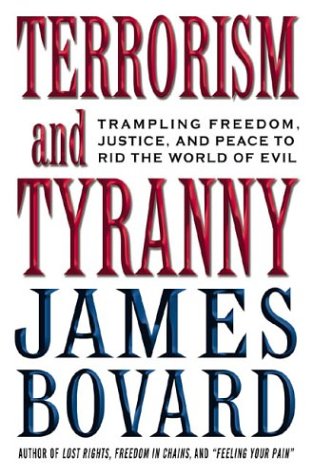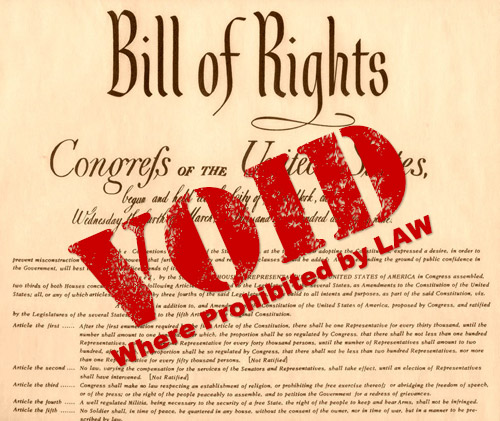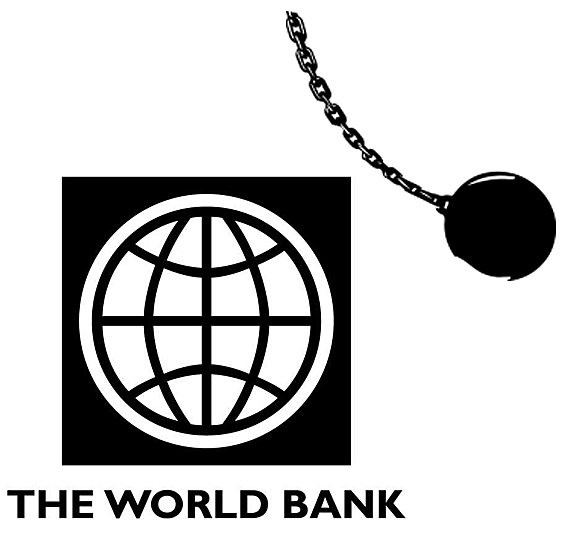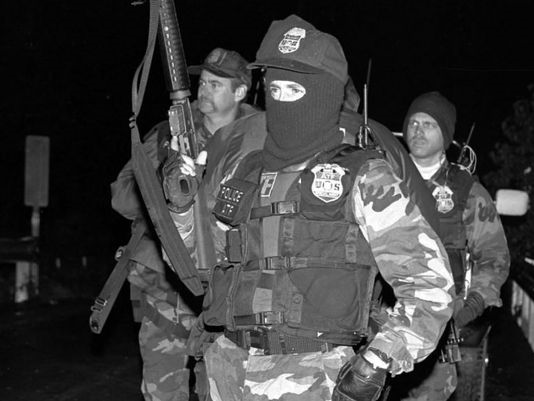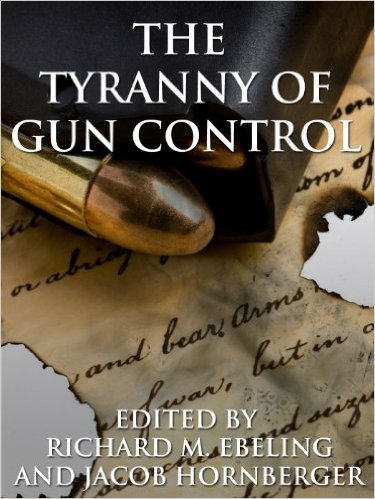![world-bank-wrecking-ball-image-for-blog-9-30-2015_edited-1]()
Rehabbing the World Bank
This is the 30th anniversary of my first attack on the World Bank in the national media. Reposted below are some of my attacks on the Bank from the Wall Street Journal and New York Times. I discuss in Public Policy Hooligan how I nabbed some of the confidential documents exposed below. The Bank continues propping up tyrants and bankrolling destructive economic policies around the globe. It should have been abolished decades ago.
Wall Street Journal
September 30, 1985
Behind the Words at the World Bank
By James Bovard
As some 9,000 interested parties gather in Seoul this week for the World Bank’s annual meeting, accolades will be heard for the bank’s new awareness of the private sector, and its crucial role in spurring international development. But what changes the bank has made in recent years don’t add up to an improvement.
Bank President A.W. Clausen often praises private
enterprise these days, but the vast majority of World Bank
loans still go to strengthen government bureaucracies and
reinforce their control over the economy. Loans to communist
countries alone have increased fourfold since 1981 and will
constitute 13.4% of the bank’s 1985 lending. The bank has
been the driving force behind the nationalization of oil and
natural gas throughout the Third World. And all the while, it
has shown too little concern for human-rights violations in
its projects.
The bank has given the government of Indonesia more than
$600 million to remove — sometimes forcibly — several
million people from the densely populated island of Java and
resettle them on comparatively barren islands elsewhere in
Indonesia. Despite reports of violence, the bank continues
lauding the project as “the largest voluntary migration” in
recent history.
The London-based Anti-Slavery Society for Human Rights
reported to the United Nations that at least one supposedly
vacant island being given to the migrants was already
inhabited — and that the Indonesian army cleared the island
by setting the original inhabitants’ crops on fire. Indonesia
is sending hundreds of thousands of migrants to the island of
Irian Jayaand the island’s original inhabitants claim they
are being driven from their lands by the Indonesian army. The
Indonesian government is also resettling Javanese on the
island of East Timor — which the army seized in 1975.
According to a 1983 Washington Post account quoting relief
workers, an estimated 150,000 of the island’s 700,000
inhabitants were killed or left to die of starvation in the
ensuing strife.
The transmigration project is supposed to make the
migrants more productive. But the project mainly moves poor
farmers from small amounts of good land to large amounts of
nearly worthless land. The government often fails to honor
its promises to provide water, roads, schools and tools. It
costs about $6,000 to move each family, yet most families
that are moved end up making little or no income from their
new habitats, and many who previously supported themselves in
Java have gone on welfare.
The Polonoroeste project in Brazil is a similar fiasco.
The bank has poured almost half a billion dollars into a
scheme to move landless farmers into cleared areas in the
Amazon tropical forests. But about all the project succeeded
in doing was building a road and encouraging tens of
thousands of people to move to an area with terrible farm
land and almost no infrastructure. The project has
pointlessly cut down hundreds of square miles of rain forests
and engendered much violence between the new arrivals and the
indigenous Indians. The bank specified in the original loan
agreement with Brazil that the Indians’ rights must be
respected, but then did nothing when the Indians’ lands were
trampled. After two years’ uproar by U.S. environmental
groups and extensive congressional hearings, the bank has
temporarily stopped funding the project.
To its credit, the bank has contributed funds to help
privatize a few government corporations in Africa and Asia.
But at the same time the bank is spending a few million
dollars to resurrect private companies that previous bank
loans often helped nationalize, it is pouring billions into
maintaining state-owned enterprises (SOEs) throughout the
Third World.
The bank’s latest kick is “public sector improvement
loans” — basically, transferring the cost of socialist
inefficiency from the recipient government to the World
Bank’s donors. Morocco received $200 million for “actions to
improve public investment planning and the functioning of the
public enterprise sector.” Chile received $11 million to help
the government “orient and guide the process of resource
allocations” among SOEs. Ecuador received $14 million “to
increase the public sector’s contribution to economic growth
by improving the management of key public enterprises.”
The bank’s biggest socialistic binge is occurring in
energy projects. Most World Bank energy loans either displace
foreign private investment or deter the development of
private companies in recipient countries. World Bank 1985
energy loans include $92 million to the Yugoslavian
government for oil and gas exploration, $233 million to the
Pakistani government oil companies, $248 million to the
Indian government for coal-mine development, and $110 million
to the Bangladesh government for natural gas exploration.
These loans do nothing to increase development — but only
add to the size of Third World governments, breeding more
bureaucrats and fewer entrepreneurs.
The biggest change at the bank since Mr. Clausen took over
in 1981 is the huge increase in lending to communist
countries. Since 1981, China, Romania, Ethiopia, Yugoslavia
and Hungary have received more than $6 billion — including
almost $2 billion in 1985. Even though China has easy access
to commercial credit, Mr. Clausen favors doubling World Bank
lending to China from the current $1 billion a year. Nor is
World Bank financing being used to pry China away from
socialism — the bank gave China a $47 million zero-interest,
50-year loan for the development of its state farms.
The bank also is busy subsidizing America’s trade
competitors. South Korea received $556 million in World Bank
loans this past year for purposes like providing “much needed
capital for economically and financially viable industrial
projects” and enhancing rail capacity in the Seoul industrial
corridor. South Korea is better managed than most World Bank
borrowers — but, like most borrowers, it has long had easy
access to commercial credit and need not rely on the bank’s
subsidies.
The bank, like most international organizations, has tried
to use the African famine to drum up support to boost its own
budget. Though much of Mr. Clausen’s rhetoric is devoted to
Africa’s dire straits, barely 10% of the bank’s 1985 loans
have gone to sub-Saharan Africa. And the biggest beneficiary
was Ethiopia.
This past year, much to the bank’s embarrassment, its loan
volume fell 7%. A classified internal World Bank memo late
last year outlined plans to relax all types of loan
requirements in order to spur borrower demand. The bank
subsequently abolished its one-quarter percent “handling fee”
on loans. The bank currently has $17 billion in unlent cash
reserves.
Despite the bank’s inability to meet its loan goals, Mr.
Clausen wants to expand. Earlier this year he said he hoped
to request a $40 billion increase in callable capital
(existing total: $55.8 billion), though he may be retreating
from that goal now. Whatever, Mr. Clausen wants the bank to
have a larger role in managing the international debt crisis
— which would be akin to appointing Mrs. O’Leary’s cow chief
of the Chicago Fire Department.
Mr. Clausen and his predecessor, Robert McNamara, beat the
bushes to encourage more commercial lending to Third World
governments. Now we have a debt problem that is indeed
serious, and foolish American banks are in trouble. But if
the U.S. wants to bail out its banks it should give them the
money directly and not launder the handouts through the World
Bank and Third World governments.
Mr. Clausen’s term as bank president expires in mid-1986.
The U.S., as the bank’s largest shareholder, has effective
power to appoint a new bank president. One hopes the Reagan
administration will find a replacement, but in the meantime
the funding issue must be addressed.
The bank can sustain a lending level of $13 billion a year
simply by relying on its principal repayment and interest
earnings. Its 1985 lending amounts to $14.4 billion. That’s
more than enough to cover good projects to well-managed
countries that do not have access to commercial credit. A
poorer bank would be a wiser bank — and a better friend to
the Third World.
—tagline: Mr. Bovard is a Washington-based freelance journalist.
******
Wall Street Journal
September 23, 1987
World Bank Confidentially Damns Itself
By James Bovard
The World Bank is preparing to ask the U.S. for an
additional $10 billion in cash and guarantees to expand its
lending. The bank claims that it must boost its lending in
order to encourage market-oriented reforms in Third World
countries. But the bank’s own confidential reports reveal
that its structural-adjustment program has been a dismal
failure.
World Bank President Barber Conable and other bank
officials are now preaching a private-sector gospel,
stressing that the private sector is the key to economic
growth and a strong future. They are right on this score —
and it is good that someone at the bank finally recognizes
the true source of economic growth.
But every time the bank loudly praises the private sector,
it silently damns its own record. The bank financed and
approved the massive expansion of government power throughout
the Third World. A 1987 World Bank study by Keith Marsden and
Therese Belot implied that World Bank aid and other foreign
aid was a major culprit in the nationalization of African
economies: “Foreign loans have reinforced the heavy public
sector bias of African investments.”
The bank’s flagship structural-adjustment lending (SAL)
program was launched in 1980 to encourage policy reform. SALs
have allowed the bank to greatly increase its loans in the
1980s.
But, SALs are often used to perpetuate government control
rather to induce pro-market reforms. A 1986 confidential
study surveyed 10 countries that received SALs and concluded
that only two countries substantially reduced their budget
deficits. The report noted that “not infrequently,” World
Bank officers were more interested in preparing new loans
than in supervising the structural-adjustment process.
What have SALs gone for? In the Ivory Coast, the SAL was
used to pay the debts of floundering government enterprises.
In Senegal, the SAL bankrolled the budgets of
government-owned agricultural companies. In Pakistan, bank
aid was used to “rationalize” state-owned companies, but
auditors concluded that efficiency had not been increased and
that the companies are still inefficient and losing money.
The 1986 report noted, “Under most of the 15 SALs in the
10 countries, restrictions placed on the use of SAL funds
were minimal.” It appears that most of the money was used to
conduct business as usual, thus perpetuating government
waste. The World Bank encourages recipient governments to
spend SALs for export subsidies — which only perpetuates
distortions in the domestic economy.
The bank has a very generous measure of success of its
SALs. The bank officially judged Bolivia “to have complied
with the spirit of the Loan Agreement” in the early 1980s,
though bank auditors disagreed, concluding that the SAL “was
unsuccessful; reforms were minimal and short-lived.”
The SALs’ timid efforts to require reform are often
defeated because governments can easily acquire foreign aid
elsewhere. The 1986 bank report noted: “The availability of
alternative financial sources, often without strict
conditionality [including other loans from the World Bank],
reduces the need for the bank to provide a SAL. . . . In
Jamaica and Senegal, availability of substantial foreign aid
led governments to decide initially that it was not necessary
to devalue or to substantially reduce budget deficits.”
A 1985 confidential bank report by leading development
expert Elliot Berg and consultant Alan Batchelder concluded:
“The SAL’s seemingly hard and all-encompassing conditionality
is largely illusory . . . the Bank must shrink from the
ultimate sanction, cancellation. Cessation of disbursements
is too strong a response by the Bank to banal acts of
non-performance. In the one case where it was done (Senegal)
the SAL was replaced by new [World Bank] credits.”
SALs often neglect key problems because of World Bank fear
of offending the recipient government. One bank official who
has worked extensively with SALs complained that the Mexican
structural adjustment loan made no mention of imposing limits
on corruption or on capital flight — two of Mexico’s biggest
problems. The bank reportedly did not even push Mexico to
install a decent auditing system to control graft.
Yugoslavia received a $275 million structural-adjustment
loan in 1983 to improve “the efficiency and competitiveness
of the economy.” But the Yugoslavian economy today is a
shambles, with hyperinflation, high unemployment and
oppressive debt. A 1987 World Bank report concluded that
“real interest rates are still negative, and the intended
reforms related to financial discipline, investment criteria
and foreign exchange and credit allocation are not yet in
place.”
Most bank project loans also fail to spur reform. A 1985
bank audit report concluded that, though most recipient
governments promise to make reforms when borrowing bank
money, the promised reforms are rarely made, and that “a
typical reaction by the Bank” to noncompliance has been to
conclude that additional loans are necessary to further
encourage policy reform.
The bank recently gave Jamaica $34 million to reform its
government sugar estates, the latest in a series of loans
since 1978. The bank’s press release claimed, “Since the
early 1980s, the government has been implementing a major
rationalization of the state-owned sugar industry as part of
its broader economic adjustment effort in order to make it
financially viable.” Yet, a 1985 confidential World Bank
report on Jamaica concluded, “Despite major effort, little
progress has been made at improving management of the
government’s sugar estates.”
Some foreign-aid advocates imply that a wave of
privatization is sweeping the Third World. But a recent 1987
bank study on privatization “found few instances of formal
liquidations in the 28 countries reviewed. . . . Sales of
large numbers of enterprises are also few, occurring in only
two countries, Chile and Bangladesh.”
The bank cannot force governments to reform because the
bank is often more eager to lend than Third World governments
are to borrow. A 1987 bank audit report concluded that some
bank projects suffered from “an unseemly pressure to lend,”
and that Third World governments have been pressured by bank
officers to borrow money for projects that later turned out
to be fiascos.
As more and more countries receive SALs, the bank will
likely be able to find a few success stories. Thailand and
Turkey received SALs after they had begun pro-market reforms.
But the vast majority of SAL recipients continue to have
self-defeating economic policies before, during, and after
their SALs.
As the 1985 Berg-Batchelder study concluded: “Why don’t
governments change the policies that are holding back their
development? . . . What has money got to do with all this
anyway? Why do external donors have to pay money to induce
LDC governments to do things that we (and presumably they)
believe will make them better off?”
The vast majority of pro-market reforms do not require
foreign cash to implement. If governments would only respect
the lives and property of their citizens, allow people to
start their own businesses, and roll back bureaucratic
control, then countries could boost their living standards
without boosting their debt load.
If the bank is serious about providing capital only to
countries following productive economic policies, how can it
justify giving a single dollar to Ethiopia? The bank recently
lent Ethiopia $14 million for, among other things,
“institutional development of the Ministry of Agriculture.”
But the ministry is heavily involved in the government’s
murderous villagization program, whereby the Marxist rulers
are trying to force 33 million peasants (three-quarters of
the population) to move their homes and live in
government-supervised villages. This is economic development?
If the U.S. does pledge an additional $10 billion for the
bank, one of the major beneficiaries could be the Soviet
Union, which is currently seeking access to bank-subsidized
loans. Barber Conable stated last fall that he would be
“happy” to consider Soviet membership, and Undersecretary of
State John Whitehead said in March that the U.S. “would like
to see the Soviet Union become a member of” the World Bank,
the IMF and GATT.
Has the World Bank helped the Third World? Some countries
have benefited — but most of the long-term aid recipients
have ended up with heavy debt loads, swollen public sectors
and overvalued exchange rates. Instead of spurring reform,
most aid has simply allowed governments to perpetuate their
mistakes.
If the bank has not straightened out Third World economic
policies after handing out over a hundred billion dollars,
why should we trust it with more money?
*************
Wall Street Journal
Tuesday, June 21, 1988
World Bank Unit’s Lip Service to Private Sector
By James Bovard
Treasury Secretary James Baker lauds the International
Finance Corporation, the private-sector affiliate of the
World Bank, as “the flagship of the private sector in the
Third World.” The World Bank is lobbying Congress for an
additional $14 billion U.S. commitment to expand World Bank
lending, and the IFC is seen as a model for what an expanded
World Bank could do. But many, if not most, IFC loans go to
government-controlled enterprises and the IFC has a growing
enthusiasm for investing in Communist countries.
According to Sir William Ryrie, the IFC’s chief executive
officer under titular head Barber Conable, “The main
initiative and drive and the bulk of the capital required
[for IFC investments] must come from the private sector.”
Yet, the IFC invested $17 million in an automobile plant in
China in 1985 where the only private-sector involvement was a
stake of less than 10% held by Peugeot. Private foreign
investment in China has nosedived in very recent years due to
increased Chinese government restrictions on foreign
investors. Yet, according to Toerstein Stephansen, director
of the IFC’s Asian/Pacific branch, “Money is available and we
can, each year, provide up to $100 million in investment to
projects in China.”
The largest recipient of IFC loans is Yugoslavia, with
almost $400 million in such aid. Yet Yugoslavia’s private
sector has fallen, according to Radio Free Europe, from 27%
of gross national product in 1962 to 5% in 1986.
The IFC has invested heavily in the Yugoslavian banking
system, and thus is likely eventually to show losses from
last year’s banking collapse, as well as from the nation’s
inflation rate of as much as 200%. (Until recently,
Yugoslavian government controls held interest rates on loans
at rates far below the inflation rate).
Despite the IFC’s purported commitment to private
enterprise, it recently invested $3.2 million to help set up
a new government-controlled bank in Hungary to make loans to
state-owned enterprises and cooperatives — and this at a
time when the Hungarian government levied heavy new taxes on
the limited private enterprises that do exist.
The IFC is eager to begin lending to Poland, as a March 24
confidential project analysis sent to the chairman of the
IFC’s Investment Committee shows. In it, Douglas Gustafson,
the IFC’s director of investment for Europe and the Middle
East, says of a proposed $18 million loan to a Polish fruit
and vegetable cooperative:
“Given the continuing uncertainties about how and when the
IMF may [give aid to Poland,] there is a real danger that the
Polish authorities may become frustrated with the
international financial institutions. IFC has the possibility
to act as a bridge during this interim period, by providing a
relatively small loan and demonstrating the good intent of
the World Bank Group. . . . A fast, early investment by IFC
would have enormous effect on IFC’s standing in Poland, would
demonstrate IFC to be a flexible, responsible institution and
would increase the number of investment possibilities in the
pipeline. IFC would achieve a great deal of good will by an
early investment.”
The World Bank wants to be loved by its bankrupt Communist
borrowers — and also wants to maximize the “investment
possibilities” for increased World Bank handouts and growth.
Poland has a $40 billion debt that it will never repay — yet
the World Bank is worried about winning Poland’s “good will.”
To maintain an appearance of private-sector orientation,
IFC loans are prohibited from being guaranteed by
governments. Yet, the Polish loan would be guaranteed by Bank
Handlowy, which is fully owned by the Polish Ministry of
Finance. The IFC skirts this requirement by claiming that
Bank Handlowy is a “commercial bank,” and notes in the
project analysis: “This approach is similar to that adopted
in Yugoslavia and Hungary.” The investment is justified
partly on the analysis of the borrower’s net worth, which the
IFC calculates based on an exchange rate of 175 zlotys to the
dollar — even though the black-market exchange rate in
Poland is roughly 1,300 to the dollar.
Outside of the East Bloc, many IFC projects look like
international versions of Urban Development Action Grants,
funding activities that could occur regardless of IFC
handouts. The IFC chipped in $6 million for a Ramada
Renaissance Hotel in Grenada, $7 million for a Sheraton Hotel
in Fiji, $3.6 million for the expansion of an
Intercontinental Hotel in Kenya. As with UDAGs, projects
often are justified by the number of “jobs created.” An IFC
press release claimed that a $28 million IFC-supported P.T.
Bali Holiday Village resort in Indonesia would create “some
300 direct jobs.” But, since the average Indonesian
per-capita income is $550, spending almost $90,000 per new
job is not quite a bargain.
IFC loans often simply underwrite partnerships between
multinational corporations and Third World governments. The
IFC lent $9 million to Yemen Hunt Oil Co. in 1985 to build a
refinery, in a project that also received a $20 million
guarantee from the U.S. Overseas Private Investment
Corporation. Hunt Oil Co. has been in partnership with the
Yemen Arab Republic since 1981 — and it is hard to see how
providing an IFC cash injection long after the partnership
began achieved anything.
The IFC claims that 41 of its 92 investments last year
were in companies that were entirely private-sector. Yet,
many of the companies the IFC claims are completely private
have an extensive government role. In Zambia, the IFC says
Zambia Cashew Co. and the Gwembe Valley Development Co. are
completely private, but according to Cecilia Momeka of the
Zambian Embassy in Washington, the government owns 51% of
every corporation in the country. In Togo, the IFC claims
that an $850,000 loan went to a private steel mill, but the
mill actually is owned by the government and leased for 10
years to a private individual. Moreover, as part of the
leasing agreement, Togo promised to keep a 41% tariff on
imported steel.
In Argentina, the IFC claims that loans went to three
totally private entities in Argentina, but the Argentine
government owns stock in all three. In Ghana, the IFC claims
an oil-exploration program it is helping is private, but the
Ghanaian government owns substantial shares in the
corporation. And in China, the IFC claims that China
Investment Co. is completely private-but the company will be
investing in joint projects between the government of China
and foreign investors, which the Chinese government will
largely control. In Zimbabwe, the IFC lent $10 million to udc
Ltd., a Zimbabwean finance organization, for lending to
Zimbabwean businesses. The IFC classifies this project as
strictly private-sector. However, every loan that udc Ltd.
makes must first be approved by Zimbabwe’s Ministry of
Industry and Technology or Ministry of Trade and Commerce.
Some IFC loans may actually increase political control
over the economy. The IFC has provided five loans to the
Panafrican Paper Mills in Kenya since 1970. As part of the
Kenyan government’s contributions to helping the
public-private entity, it sharply increased tariffs on
imported paper. The results looked good on Panafrican’s
balance sheets but clobbered the Kenyan people with higher
paper prices.
The IFC’s 1985-89 five-year plan calls for a 7% annual
increase in loan-investment volume, currently at $1.1
billion. To meet its growth targets, the IFC is planning to
increase its investments in South Korea at a time when the
private sector is doing just fine on its own. South Korea has
already attracted a flood of foreign private investment
without the IFC, and the IFC is in Korea largely to boost its
loan and equity investments and to snare easy profits.
The IFC, along with the World Bank in general, is based on
the idea that a handout provides a stronger incentive than
sheer necessity to adopt sound economic policies. Many
economists in recipient countries disagree.
Martin Tardos, director of the Hungarian Academy of
Science’s Institute of Economics, notes: “The World Bank
money has made life easier for the Hungarian government and
made it possible to avoid deep market-oriented change. The
World Bank was not setting conditions for real changes and it
accepted the rhetoric for the reality.” In Poland, private
citizens have vast dollar reserves saved up in their
mattresses. Yet because they have no security for their
investments, they don’t invest in Polish companies, as Jan
Vanous of Planecon Consultants in Washington observes. It is
absurd to inject dollars into a country when its own people
have no faith in the economic system.
The IFC, like the World Bank in general, has failed in its
effort to buy economic reform from Third World and Eastern
European politicians. Necessity is still the best incentive
for sound economic reform. Insofar as the World Bank reduces
the pressure of necessity without securing real reform, it
has betrayed the citizens of the Third World and East Europe.
*****************
The New York Times July 30, 1989, Sunday,
HEADLINE: BUSINESS FORUM: THE WORLD BANK;
Fostering America’s Interests Abroad . . . But It Lends to Oppressive Regimes
BYLINE: By JAMES BOVARD; James Bovard is the author of ”The Farm Fiasco.”
Barber Conable, the former New York Congressman, took over the World Bank in
l986 promising to reorganize and redirect it. But, after three years, little has
changed and the bank, the largest multilateral institution in the world,
continues financing regimes that oppress people and mangle economies.
The New York Times, July 30, 1989
Last September, Congress approved a 4 billion pledge of callable capital to
allow the bank to borrow more money and rapidly increase its lending. Mr.
Conable boasts that the bank committed over $20 billion to the third world and
East Europe in l988, and World Bank officials have already spoken of lending up
to $24 billion in l989.
Unfortunately, the bank is setting new lending records by providing more and
more capital to less and less creditworthy regimes. Eight nations have ceased
repaying World Bank loans, and the bank has set up a special program to give new
money to governments to repay their old loans.
South Korea continues to receive extensive World Bank aid, even though it is
a major industrial power with a huge manufacturing trade surplus. Yet when Mr.
Conable was lobbying for this year’s $14 billion American pledge, he denied that
South Korea was receiving any subsidy from the World Bank, because the interest
rate charged on the Koreans’ loan was a shade above the bank’s borrowing rate.
But all World Bank loans are effectively subsidized by being underwritten by the
United States and other Western governments, and Korea has received loans at
below-market interest rates from the bank.
Mr. Conable also misrepresented the nature of the World Bank’s efforts in
Ethiopia. The Ethiopian Government is brutalizing its own people and doing its
The New York Times, July 30, 1989
best to make Idi Amin look like a moderate. The Government has begun a program
to forcibly move three-quarters of the country’s poulation into
Government-controlled villages, and last February peasants who resisted the
Government’s notorious resettlement program were massacred by the Ethiopian
army. Even so, the World Bank has continued providing a huge amount of aid –
including over $100 million in l988 – to the Ethiopian Government.
During the l980’s, the fastest growing part of the bank’s portfolio has been
loans to communist governments. Mr. Conable told Congress, ”The World Bank has
been instrumental in encouraging communist governments to decentralize and
liberalize their economies and introduce economic market incentives.” But in
November l986, an internal review by the World Bank’s North African, Middle
Eastern, and European section examined World Bank loans to Hungary, Romania and
Yugoslavia and concluded: ”The major problem has been the unwillingness of
these countries to allow bank involvement in policy issues. Projects have been
prepared to meet Five-Year Plan objectives which could not be questioned or
analyzed by the bank.” World Bank money has therefore gone to finance the usual
priorities of the communist governments.
The World Bank is priding itself on its structural adjustment program that
allegedly exists to finance market-oriented reforms by recipients. But an August
l988 confidential World Bank analysis of the effects of structural adjustment
The New York Times, July 30, 1989
lending showed that African countries that received adjustment loans are now
doing significantly worse economically than African countries that had not
received such loans. Worldwide, among governments that received structural
adjustment loans, comparing the period before and after receiving the loans, the
World Bank study found that average external debt-export ratios increased from
272 percent to 392 percent, inflation increased in the majority of countries,
and the average ratio of government expenditures to gross domestic product
increased sharply, from 27.0 percent to 30.5 percent. The rise in government
spending was predictable, since structural adjustment loans have been used to
increase tax collection, raise civil service salaries and bail out floundering
state-owned companies. These efforts epitomize the World Bank’s concept of
”free market.”
Mr. CONABLE declared in l987, ”Our common goal should be to restore the
major debtor countries to full creditworthiness within five to seven years.” At
times, he talks as if creditworthiness were a mysterious vapor that the bank can
create simply by dispersing more billions to needy governments. Many Latin
American countries are not creditworthy largely because they are not
trustworthy. Much of their problem is that their own citizens, if they can save
a few dollars, send it out of the country as soon as possible before a
politician steals it.
The New York Times, July 30, 1989
The World Bank’s ”have money, must lend” syndrome will continue to be a
curse to the world’s oppressed citizens and a threat to financial stability. Mr.
Conable should retire as soon as possible.
******
The post World Bank Ravages the Third World – 30th Anniv. appeared first on James Bovard.
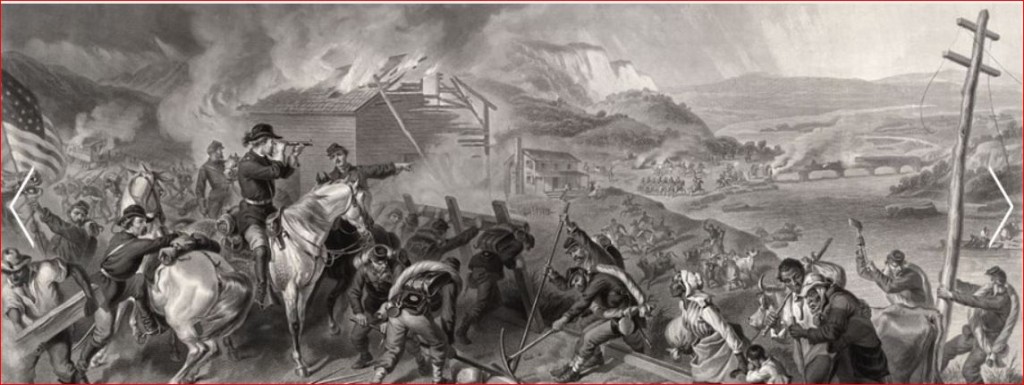 This is the 150th anniversary of General Lee’s surrender at Appomattox. Many commentators are touting Lee’s surrender as a triumph for freedom. While it was a great blessing that slavery ended, the Civil War set precedents for ignoring atrocities that continue to bedevil America. Here’s a piece from the January issue of The Future of Freedom:
This is the 150th anniversary of General Lee’s surrender at Appomattox. Many commentators are touting Lee’s surrender as a triumph for freedom. While it was a great blessing that slavery ended, the Civil War set precedents for ignoring atrocities that continue to bedevil America. Here’s a piece from the January issue of The Future of Freedom:


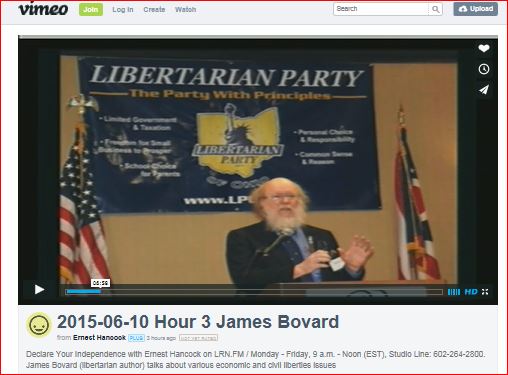


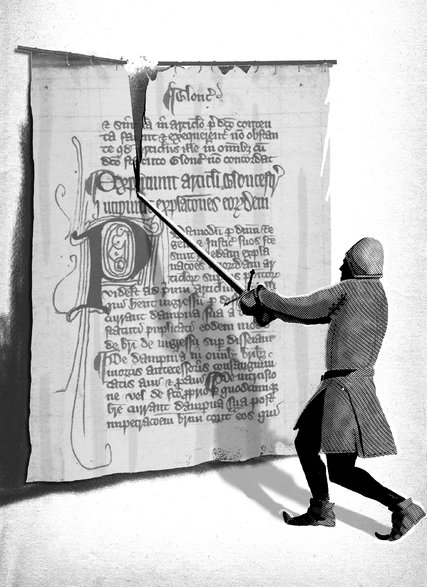


 from the
from the 

